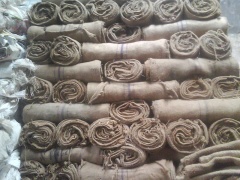Gunnies (jute bags)
| Infobox on Gunnies (jute bags) | |
|---|---|
| Example of Gunnies (jute bags) |  |
| Facts | |
| Origin | - |
| Stowage factor (in m3/t) | 1,98 m3/t (bales) |
| Humidity / moisture | - |
| Ventilation | - |
| Risk factors | See text |
Gunnies (jute bags)
Description
A gunny sack is an inexpensive bag made of burlap, also known as a 'gunny shoe'. Gunny sacks are traditionally used for transporting grains, potatoes, and other agricultural products. Sometimes they are also used as sandbags for erosion control. They are usually made from jute or other natural fibers, although modern sacks are often made from polypropylene.
A gunny sack holds approximately 50 kg. of potatoes.
Because gunny sacks are/were (traditionally) made from natural fibers, they are considered to be environmentally friendly. They are non-carcinogenic and non-toxic. High breathability allows air to pass through them, which helps packaged grains or other agricultural commodities stay fresh.
Sacks made from jute, hemp and kenaf fiber have high tensile strength. As a result, piling sacks one on top of the other does not tear or distort the yarn of the lowest residing sacks in the pile.
Shipment / Storage / Risk factors
Shipped packed in bales.
Contamination by water will cause the bags to deteriorate. Sometimes iron hoops, if rusted, will burst as a result of the swelling of bales due to absorption of water. Care must be taken in any analysis to determine whether or not the damage has been caused by salt or fresh water, for the reason that the gunnies may have absorbed a certain amount of salt from the atmosphere at the place of shipment, and, before expressing the view that damage has been caused by contact with salt water, the surveyor should satisfy himself that this is, in fact, the true cause of the damage.
Gunnies packed by mills in wet condition may arrive in varying stages of rottenness depending on the voyage. Wetted gunnies should be immediately opened up and dried to avoid rotting. Material becomes discoloured, yellow to yellow-orange, when in contact with acid material, and is weakened. Should be stowed away from oils, grease and moist cargoes.











